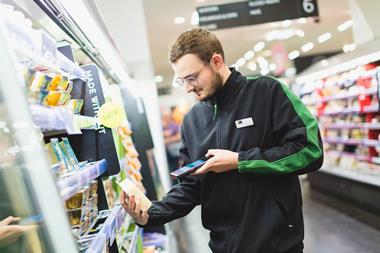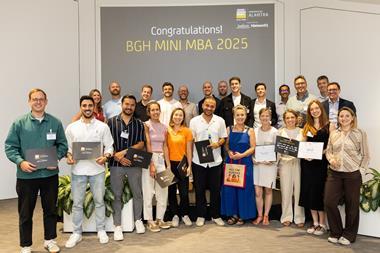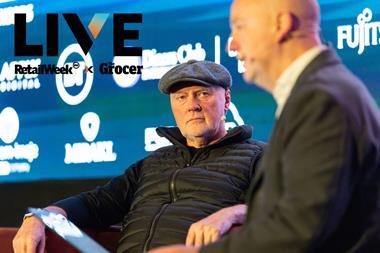The company, which already has a number of major brands in the UK such as Pepsi, Walkers and Tropicana, is looking to introduce a range of snack products it acquired with its purchase of Quaker Oats Company last year, as well as Gatorade, which Nooyi says has an 85% market share of the US sports drinks market.
Nooyi says: "The UK is a big engine of growth for us and is where we have some of our best executives. The expanded Quaker portfolio will definitely come into the UK."
Walkers' expertise will be used to build sales of Quaker products such as Snack-a-Jacks.
Walkers president Martin Glenn says: "Snack-a-Jacks has been a huge success in the UK market, growing 65% this year. Walkers will take over distribution of Snack-a-Jacks in the impulse sector on behalf of Quaker, using our distribution reach to get it into more places."
Work on the launch of Gatorade is at an early stage however. Nooyi says: "First, in the UK we need to work out whether it makes sense for retailers, is it incremental, what price point is incremental? So there is a lot of work to be done. When we launch Gatorade we will do it right."
Organic growth favoured
As a global business, says Nooyi, PepsiCo classifies its products as three types: fun for you, such as Pepsi and Walkers crisps; better for you products such as Pepsi Lite and Walkers Lite; and good for you, which encompasses many of the oat products it acquired in the Quaker deal. Currently fun for you accounts for 65% of global sales with better for you and good for you making up the other 35%, but PepsiCo's long-term strategy is to grow the better/good for you categories to achieve a 50%:50% balance.
Nooyi says there are four ways that PepsiCo grows its business, with organic growth the favoured option. A second method that she labels "buy in" is through buying a low selling product, and improving the quality and the packaging, and introducing innovation to the brand. "Take Cracker Jack. It was a dying brand in the US. We bought it, rejuvenated it, extended the brand and it has a new lease of life," she says.
Adapt and improve is the third method. "We see a product, we like it. We copy it and build on it." The Quaker Fruit and oatmeal bar in the US is an example. "Initially it was a copy but then we made bite sizes. We made a unique brand by adapting and improving it."
PepsiCo has proved it is willing to make large scale acquisitions, such as the Quaker deal last year, but Nooyi says: "No business can afford to make large scale acquisitions regularly. If we make a large scale acquisition we do it very carefully and ask whether we can do a better job with the business."
Although PepsiCo's name is synonymous with beverages, the bulk of the business is in snacks and, says Nooyi, it is second in the world market for beverages, and number one in snacks. The company is probably unique, she adds, in that it has 15 brands, each with a turnover in excess of $1bn, and all of them lifestyle brands.
"We believe Pepsi is positioned right in the sweet spot of consumer eating and drinking habits and our goal is to produce a whole range of products so that if you are in a fun mood or a nutritious mood, or whatever, we just want to be there when you have an urge to eat or drink something. Our goal is to make that available all over the world."
{{ANALYSIS }}
Nooyi says: "The UK is a big engine of growth for us and is where we have some of our best executives. The expanded Quaker portfolio will definitely come into the UK."
Walkers' expertise will be used to build sales of Quaker products such as Snack-a-Jacks.
Walkers president Martin Glenn says: "Snack-a-Jacks has been a huge success in the UK market, growing 65% this year. Walkers will take over distribution of Snack-a-Jacks in the impulse sector on behalf of Quaker, using our distribution reach to get it into more places."
Work on the launch of Gatorade is at an early stage however. Nooyi says: "First, in the UK we need to work out whether it makes sense for retailers, is it incremental, what price point is incremental? So there is a lot of work to be done. When we launch Gatorade we will do it right."
Organic growth favoured
As a global business, says Nooyi, PepsiCo classifies its products as three types: fun for you, such as Pepsi and Walkers crisps; better for you products such as Pepsi Lite and Walkers Lite; and good for you, which encompasses many of the oat products it acquired in the Quaker deal. Currently fun for you accounts for 65% of global sales with better for you and good for you making up the other 35%, but PepsiCo's long-term strategy is to grow the better/good for you categories to achieve a 50%:50% balance.
Nooyi says there are four ways that PepsiCo grows its business, with organic growth the favoured option. A second method that she labels "buy in" is through buying a low selling product, and improving the quality and the packaging, and introducing innovation to the brand. "Take Cracker Jack. It was a dying brand in the US. We bought it, rejuvenated it, extended the brand and it has a new lease of life," she says.
Adapt and improve is the third method. "We see a product, we like it. We copy it and build on it." The Quaker Fruit and oatmeal bar in the US is an example. "Initially it was a copy but then we made bite sizes. We made a unique brand by adapting and improving it."
PepsiCo has proved it is willing to make large scale acquisitions, such as the Quaker deal last year, but Nooyi says: "No business can afford to make large scale acquisitions regularly. If we make a large scale acquisition we do it very carefully and ask whether we can do a better job with the business."
Although PepsiCo's name is synonymous with beverages, the bulk of the business is in snacks and, says Nooyi, it is second in the world market for beverages, and number one in snacks. The company is probably unique, she adds, in that it has 15 brands, each with a turnover in excess of $1bn, and all of them lifestyle brands.
"We believe Pepsi is positioned right in the sweet spot of consumer eating and drinking habits and our goal is to produce a whole range of products so that if you are in a fun mood or a nutritious mood, or whatever, we just want to be there when you have an urge to eat or drink something. Our goal is to make that available all over the world."
{{ANALYSIS }}

















No comments yet